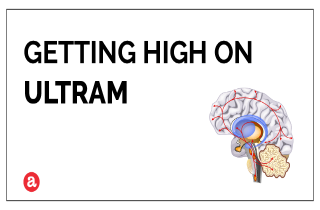Sort of.
Some people (less than 1% of those who take it) get high when taking Ultram as prescribed. Other people seek getting high on Ultram by taking more Ultram than prescribed, or in ways other than prescribed. However, the vast majority of people won’t experience any euphoric effects on Ultram, especially at normal doses. The drug is much more likely to cause dizziness, nausea, or headache than it is to reliably induce a euphoric high.
Despite this, Ultram is addictive and can create a physical dependence and drug-seeking behavior, with or without the associated high. Signs of tramadol withdrawal include both typical and atypical withdrawal characteristics. More below on Ultram ingredients and the Ultram high. Plus, we invite you to ask your questions about getting high on Ultram at the end.
What’s in Ultram?
Ultram contains a drug called tramadol, which is an opioid medication. Ultram is used to relieve moderate to severe pain, and sometimes other conditions. Dangers of tramadol are relatively low when compared with other opiate or opioid medications. Therefore, Ultram is available in an extended-release formula to offer around-the-clock pain relief to people who experience chronic pain.
Ultram and euphoria
Ultram can create a euphoric high in some people, but at normal doses this occurs in less than 1% of the population. The effect may be slightly more likely at higher doses. More common side effects of Ultram, occurring in up to 90% of the population, include:
- dizziness
- dry mouth
- headache
- insomnia
- sweating
- vomiting
Ultram and central nervous system effects
Ultram affects the levels of norepinephrine and serotonin in the brain, which help relieve pain. The tramadol contained in Ultram works as a central nervous system depressant, and can cause drowsiness and dizziness, as well as more serious adverse effects. Serious side effects always need medical attention, especially because they could potentially indicate an overdose. Adverse side effects caused by Ultram that require medical attention include:
- difficulty breathing
- extreme drowsiness
- hallucinations
- seizures
- unconsciousness
Mixing Ultram with other substances
Ultram can potentially interact with a number of other prescription medications, including antifungals, heart medications, sedatives, SSRIs, MOAIs, and more. Any medications or drugs that depress the central nervous system are of special concern – these drugs may increase the likelihood of adverse effects when taking Tramadol. Likewise, if you are on Ultram you should drink alcohol with care and according to safety guidelines outlined by your doctor – some people may not be able to drink while using the tramadol in Ultram at all.
Getting high on Ultram
People will usually try to get high on Ultram by crushing the pills, then snorting or injecting the powder, because it is so hard to get high from this medication. Doing this is dangerous and can cause serious side effects or even death. Snorting Ultram, smoking Ultram, or shooting Ultram is especially dangerous when taking an entire extended release capsule at once.
Risks of Ultram addiction
Are Ultrams addictive? Yes. Although most people can’t get high off of Ultram, it is possible to become addicted to the tramadol contained in ultram. In fact, taking Ultram for long periods of time or in large amounts can create a physical dependence even if you are taking Ultram as prescribed. Once you’re physically dependent on Ultram, you can’t stop taking the medication abruptly – the withdrawal effects can be serious, including seizures. But how is dependence different than addiction?
Physical dependence on any drug does not necessarily mean addiction. Ultram addicts need to use the drug to function, even after Ultram withdrawal when the drug is out of the system. So, if you are taking Ultram to cope with emotional or psychological issues in your life, you might be an Ultram/tramadol addict. Additionally, people with a history of drug abuse and dependence are more likely to become addicted to and abuse Ultram, and should be prescribed a less addictive alternative.
Help for Ultram abuse
If you’re addicted to Ultram, it’s probably you may have been taking Ultram long-term to manage a chronic condition. If you’re having troubling side effects or want to stop taking the medication, talk to your doctor about a schedule to gradually wean yourself from Ultram safely. And always detox from medications which contain tramadol under medical supervision. This can help minimize risk of complications and provide medical help when needed. Once you have stopped using Ultram, you need to learn how to stay stopped. Several addiction treatment programs current exist – self-help (SMART Recovery), 12 step, or cognitive behavioral therapies can help you stay off Ultram.
Getting high on Ultram questions
Do you still have unanswered questions about getting high on Ultram? Please leave us your questions and comments about using Ultram here. We will be happy to respond to your questions with a personal and prompt reply.









Related Posts